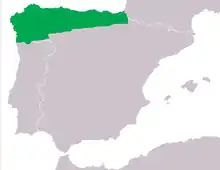Vipera seoanei
Vipera seoanei is a venomous viper species endemic to extreme southwestern France and the northern regions of Spain and Portugal.[1][2] Two subspecies are currently recognized, including the nominate race described here.[5]
| Vipera seoanei | |
|---|---|
 | |
| Scientific classification | |
| Kingdom: | Animalia |
| Phylum: | Chordata |
| Class: | Reptilia |
| Order: | Squamata |
| Suborder: | Serpentes |
| Family: | Viperidae |
| Genus: | Vipera |
| Species: | V. seoanei |
| Binomial name | |
| Vipera seoanei Lataste, 1879 | |
 | |
| Distribution of Vipera seoanei. | |
| Synonyms[2] | |
| |
Etymology
The specific name, seoanei, is in honor of Spanish naturalist Víctor López Seoane y Pardo-Montenegro.[5][7][8]
Description
Adults may grow to a total length (including tail) of 75 cm (30 in), but usually less.[3]
This is a highly polymorphic species for which four main color-pattern types have been described:[3]
A: well-developed, brown zigzig pattern down the back, very much like V. berus, set against a beige or light-gray ground color.
B: roughly twin-striped pattern, with the ground color expressed as two narrow, straight, dorsolateral longitudinal lines along the body. Resembles V. kaznakovi to some degree.
C: uniform brownish morph with no pattern.
D: fragmented zigzag pattern (see V. s. cantabrica).
Geographic range
Vipera seoanei is found in extreme southwestern France and the northern regions of Spain and Portugal.
The type locality is given as "In montibus Gallaecorum et Cantabrorum...d'Espagne" (the mountains of Galicia and Cantabrici, Spain).
Mertens and Müller (1928) suggested restricting the type locality to "Cabañas, Prov. Caruña, Spanien". According to Golay et al. (1993), this is Cabañas, near Ferrol, A Coruña province, northwestern Spain.[2]
Conservation status
This species, V. seoanei, is classified as Least Concern (LC) according to the IUCN Red List of Threatened Species (v3.1, 2001).[9] It was given this status due to its relatively wide distribution, presumed large population, and because it is unlikely to be declining fast enough to qualify for listing in a more threatened category. Year assessed: 2005.[10]
It is, however, listed as a protected species (Appendix III) under the Berne Convention.[11]
Subspecies
| Species[5] | Taxon author[5] | Geographic range[3] |
|---|---|---|
| V. s. cantabrica | Braña & Bas, 1983 | The Cantabrian Mountains of northern Spain. |
| V. s. seoanei | Lataste, 1879 | Extreme southwestern France and the northern regions of Spain and Portugal. |
References
- Pleguezuelos, Juan M.; et al. (2009). "Vipera seoanei". IUCN Red List of Threatened Species. 2009: e.T61594A12505084. Retrieved 27 October 2020.
- McDiarmid RW, Campbell JA, Touré TA (1999). Snake Species of the World: A Taxonomic and Geographic Reference, Volume 1. Washington, District of Columbia: Herpetologists' League. 511 pp. ISBN 1-893777-00-6 (series). ISBN 1-893777-01-4 (volume).
- Mallow D, Ludwig D, Nilson G (2003). True Vipers: Natural History and Toxinology of Old World Vipers. Malabar, Florida: Krieger Publishing Company. 359 pp. ISBN 0-89464-877-2.
- Steward JW (1971). The Snakes of Europe. Cranbury, New Jersey: Associated University Press (Fairleigh Dickinson University Press). 238 pp. LCCCN 77-163307. ISBN 0-8386-1023-4.
- Vipera seoanei at the Reptarium.cz Reptile Database. Accessed 27 October 2020.
- Mehrtens JM (1987). Living Snakes of the World in Color. New York: Sterling Publishers. 480 pp. ISBN 0-8069-6460-X.
- Lesure, Jean; Le Garff, Bernard (2006). L'étymologie des noms d'amphibiens et de reptiles d'Europe. Paris: Éditions Belin. 207 pp. ISBN 2-7011-4142-7. (in French).
- Beolens, Bo; Watkins, Michael; Grayson, Michael (2011). The Eponym Dictionary of Reptiles. Baltimore: Johns Hopkins University Press. xiii + 296 pp. ISBN 978-1-4214-0135-5. (Vipera seoanei, p. 241).
- Vipera seoanei at the IUCN Red List. Accessed 2 September 2007.
- 2001 Categories & Criteria (version 3.1) at the IUCN Red List. Accessed 2 September 2007.
- Convention on the Conservation of European Wildlife and Natural Habitats, Appendix III at Council of Europe. Accessed 9 October 2006.
Further reading
- Golay P, Smith HM, Broadley DG, Dixon JR, McCarthy CJ, Rage J-C, Schätti B, Toriba M (1993). Endoglyphs and Other Major Venomous Snakes of the World: A Checklist. Geneva: Azemiops. 478 pp.
- Lataste F (1879). "Diagnose d'une vipère nouvelle d'Espagne". Bulletin de la Société zoologique de France 4: 132. (Vipera berus seoanei, new subspecies). (in Latin and French).
- Mertens R, Müller L (1928). "Liste der amphibien und reptilen Europes ". Abhandlungen der Senckenbergischen Naturforschenden Gesellschaft 45: 1-62. (in German).
External links
| Wikimedia Commons has media related to Vipera seoanei. |
- Seoane's viper, Vipera seoanei at Reptiles & Amphibians of France. Accessed 30 October 2006.
